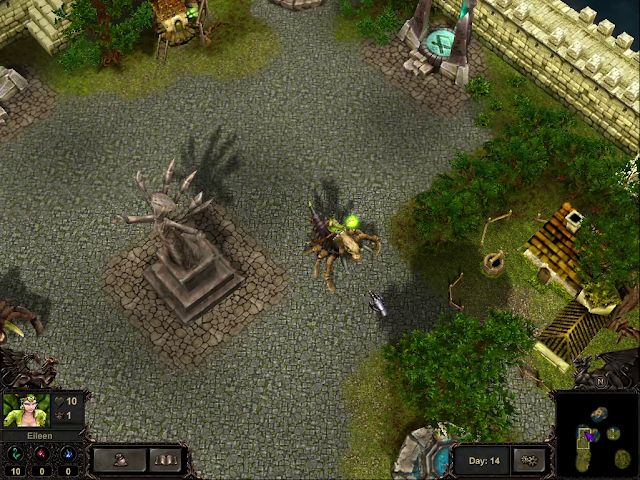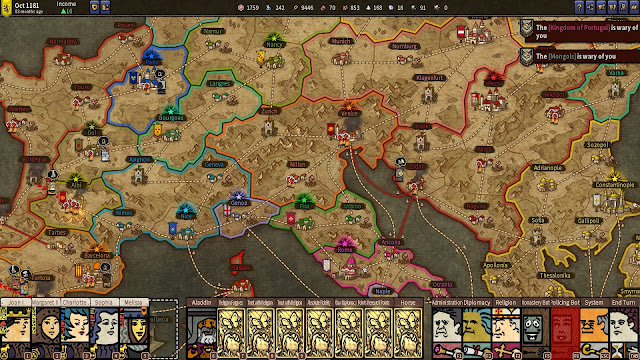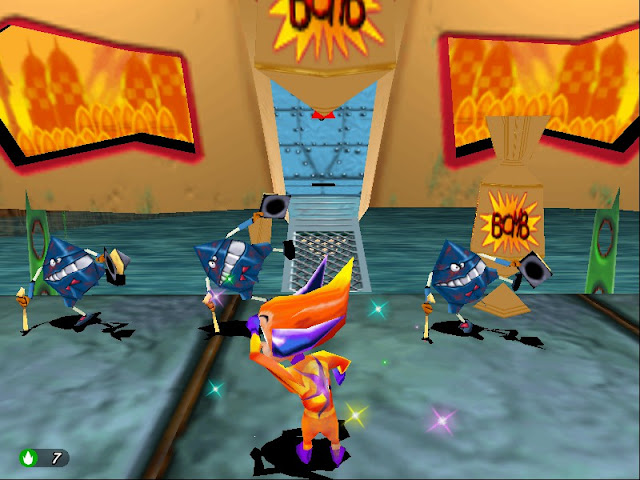Etherlords 2 Review | Card collecting without the money sink
Card games hold a special place in today's collective conscious, you can find many who enjoy this kind of hobby, both in the physical form with Magic the Gathering and in the virtual one with Hearthstone.
One of the turn-off for this genre is the constant financial investment one has to do to keep up the pace with the latest packs or expansions, least one ends up with an outdated deck and gets easily defeated by other players with much deeper pockets.
Etherlords 2 could satisfy those niche who wants to experience a deck based game without the fear of extra expenses.
Aesthetics
 |
Bracing for the adventure |
The 3d graphics have aged decently, it's very easy to deduce that this is a game from 2003 due to the low resolution textures, but the decision to use a more colorful style instead of a realistic one allowed the looks to remain relatively vibrant and appealing to the eye.
This general sentiment relates to the animations too, although the number of them can feel overwhelming and tedious after hours of playing, but they can be set to be skipped on the options' menu, so it's not a big deal.
The voice acting is mediocre, the actors don't put a lot of emphasis in their lines, one in particular who voiced a protagonist in one of the campaigns tried to do a gravy and menacing voice, but in the end he sounds more like he had a sore throat.
On the other hand, the soundtrack is decent and a bit thematic, the tracks are influenced by where you are, who are you fighting against and by who wins, I enjoyed it.
Small note, the game only offers a 4:3 resolution and stretches the image on the screen with monitors with a 16:9 aspect ratio, I was fine with it, but if you don't like it try to use a fix here.
In short, good looks, bad voice acting and ok music.
Game Mechanics
 |
The encyclopedia gives quick info about creatures and spells |
As stated in the introduction, Etherlords 2 is a turn based card game with deck building.
The two main modes that you can play are Duel and Campaign.
Dueling is the most straight forward, you choose one of four races, you pick one of the pre-made decks (or create your own) plus a specialization (I am going to talk about this particular aspect later) and after that you enter in combat with an opponent.
The campaign is a bit more structured, it has an over-world where you can walk, buy new cards, fight various encounters and ultimately shuffle between the active and reserve deck.
In the actual duels the usual dynamic works like this: at the start of a turn a mage gains an ether channel (it increases the gained ether), the same mage then passes to the evocation phase where it's possible to summon creatures or cast enchantments to buff/damage one or more creatures at the cost of ether. Most creatures suffer from invocation sickness, meaning that they won't be able to attack immediately and will have to rest a bit. When you have an available unit you can decide to pass the turn and attack the enemy mage or let them stand still, since most creatures must rest after attacking it's a good idea to keep a couple of units ready during the block phase, which happens when the enemy mage tries to send creatures to hit you, but you can avoid the damage by using one of your creatures to defend, at the risk of losing such unit. There are also some spells that can be cast during the blocking phase. Once this phase is finished, the turn ends and the cycle continues.
As you can guess, this system is very reminiscent of Magic the Gathering with the difference that instead of using the isles you find in your hand, you gain ether and ether channels constantly. This game-play loop is quite fun, as one would expect, the cards for the races synergies nicely, plus based on the theme of a race you can suppose fairly accurately what they are about and how it affects the cards at their disposal.
A more in depth look at the campaign mode.
At the start of the adventure you have a very limited set of abilities: a basic set of 16 cards (the active deck can only hold 16 of them while the reserve is infinite), move around the over-world and fight the various encounters.
It's not a lot, but new stuff gets unlocked very fast.
Stuff like specializations (passive traits that can give you some huge benefits like the possibility to cast a spell without having to spend ether), skills of various effects once you level up after gaining enough experience by killing the enemies, and artifacts (magical items with limited but rechargeable charges).
With the right choices, these things combined can be ludicrously overpowered.
The main way to get new cards is to buy them using 3 color-coded elements: one green, one red and one blue. To get these elements, you either take the piles guarded by monsters or by conquering a mine in the over-world. Cards have different costs, from some that cost only a certain amount of one element to others that require a mix of the three. You buy cards in shops scattered all over the map.
If you limit yourself to buy only a couple of cards at any shop, you are not going to have any financial problem, at least that's how I felt. Buying the cards is the only way to spend these resources, there isn't any kind of upkeep cost.
You can save pretty much everywhere, the game doesn't have any kind of restriction on saving, the only instance in which you can't save is during the duels.
The only thing worth talking about the levels is that in most cases you don't have any kind of pressure or ticking clock, you can explore at your will and pleasure, with the only obstacle represented by the enemies standing in your way.
A minor thing, but appreciated nonetheless.
The enemies you encounter have the same tool-set you have, with the only difference being that they seem to follow a theme, like evoking only one type of race of creatures. Some drop their cards once defeated, meaning that if you see something cool you could obtain it, as long as you belong to the same race of the opponent in which you saw the aforementioned thing.
If only the AI would use it effectively.
Indeed, the artificial intelligence is a hit-and-miss depending on the adversary, some use smart tactics that made me double think my strategy, others were just a disappointment and some others used tactics so cheesy and infuriating my cholesterol levels skyrocketed.
Keep this in mind, you are not the only master of the cheese, it can AND WILL be used against you.
About the difficulty, you can choose three settings: easy, medium and hard. What these changes is the number of cards available to the enemy duelists during the fights, meaning that on lighter difficulties they are more likely to run out of cards, while on harder ones they have more cards. There doesn't seem any kind of reward for playing on hard, or at least the game didn't notify me of one. Also, death has no consequence, you are not even going to lose your progress since the game puts you right before the fight started.
I have a short temper for turn based games due to the heavy RNG elements, as such I ended up playing the whole game on easy because I felt that the randomness was screwing with me, even on that difficulty I lost some fights because I got the cards in a bad order. Despite that, I really enjoyed the fights, the progression, the deck managing and the exploration.
Beating all the campaign, it took me 34 hours to finish the game.
So, basically it may be a bit too lenient on the throw of the virtual dices, but the game is really fun and interesting on a lot of aspects.
Narrative
 |
Dialogues are almost the only way of narrative progression present |
In the magical Ether World, 4 races battle for supremacy: the Vitals, allies of the forest, the Synthets, a hybrid race half man and half machine, the Chaots, barbarians from volcanic lands, and the Kinets, angel-like beings. However, the coming of mysterious pale creatures, seemly unaligned with anyone, is going to drastically change the balance of power.
At the start of the game we can decide to play 1 of 2 campaigns: one follows Eileen, vital heroine, and another one follows Konnar, chaot hero, in their struggles against the foreign invaders, the Synthets for her and the Kintes for him. Campaigns for the other 2 races are unlocked after beating the starting ones.
The actual events that happen are not that intriguing, but they are tolerable, the game really tries to give a feeling of high stakes, it's possible to notice a good degree of effort in trying to make the narrative more captivating, especially with the minor dosage of foreshadowing and twist revelations scattered throughout the experience.
It's not that I didn't care, rather I didn't feel involved as much as I think I could have been, the lack of a strong personality for the characters or any kind of optional story was certainly an important factor.
Lore wise, it's very light, with some details being revealed in the last campaign, more likely they're reference to the previous entry rather than original lore.
It's not really that interesting or explored.
In conclusion, there has been a worthy attempt to create an epic journey, but ultimately it didn't pull me in.
Recommendation:
If you ever wanted to experience a card dueling game without the financial stress, Etherlords 2 will suit you nicely.




Comments
Post a Comment